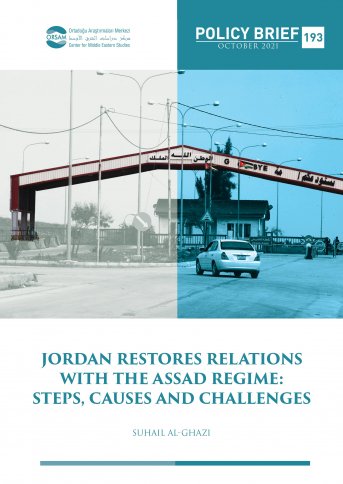
Jordan Restores Relations with the Assad Regime: Steps, Causes and Challenges
On the 3rd of this September, the Jordanian Royal Court announced that King Abdullah II had received a phone call from Syrian President Bashar al-Assad, his first call since 2011. According to a statement by the Royal Court, King Abdullah and Assad talked about relations between the two countries and ways to strengthen them, in addition to the King assuring the Syrian President of Jordan’s keenness to support Syria’s territorial integrity and stability. This contact came after several steps of rapprochement between both countries in recent months, prompted by a Jordanian plan to change the way to deal with the Syrian crisis, which receives American and Arab support.
Historically, the relationship between Syria and Jordan has been in turmoil since the Baath Party came to power in Syria and following its attempts to interfere in Jordan’s internal affairs. This interference reached its peak with the Syrian support for the Palestine Liberation Organization in its conflict with the Jordanian government in September 1970. The relationship remained turbulent even after Jordan signed the peace agreement with Israel, also known as the Wadi Araba Peace Treaty. This situation continued until a gradual improvement of relations occurred at the beginning of the 21st century, which resulted in the signing of many bilateral agreements to facilitate movement between the two countries and cooperation agreements in the field of trade, energy and water.
After the outbreak of the uprising in Syria in March 2011, Jordan joined the efforts of the Arab League to find a solution to the Syrian crisis, which, however, did not lead to any concrete result. Later in the conflict, Jordan joined other Arab and foreign countries, such as Saudi Arabia, Qatar, the USA and the EU, within the Group of Friends of Syria Conference and later hosted the Armed Opposition Support Room, known as the MOC operation Room, which included, besides Jordan, the United States and the UK. The Jordanian position on Syria further escalated when King Abdullah said in an interview, that if he were in Bashar al-Assad’s place, he would choose to leave his position for the sake of his own country. In 2017, Jordan, along with Israel and the United States, reached an agreement with Russia to reduce the escalation in southern Syria, which allowed the regime forces to retake control over the southern region in exchange for the removal of Iranian-backed forces from the border. After the reconciliation agreement in May 2018, Jordan announced the reopening of the Nassib-Jaber crossing with Syria and allowed for the passage of commercial trucks for the first time since its closure in 2015, following the capture of the area by Syrian opposition forces.
After the reopening the crossing with Syria and in conjunction with the reopening of the Emirati and Bahraini embassies in Syria at the end of 2018, Jordan appointed a charge d’affaires in Damascus for the first time since the Jordanian ambassador was withdrawn in 2012. In June 2021, the Syrian Ministers of Electricity and Oil, Bassam Tohme and Ghassan Al-Zamel, met with the Jordanian Minister of Energy, Hala Zawati, in Amman and discussed issues related to the electrical power grid, the infrastructure of the Arab Gas Pipeline, and potential cooperation in the energy field, according to official statements. On the ninth of September, the energy ministers from Egypt, Lebanon and Syria met in Jordan to discuss the plan to transport Egyptian gas to Lebanon via Jordan and Syria, a plan mentioned by the US Ambassador to Lebanon Dorothy Shea which aimed at improving the electrical supply situation in Lebanon previously presented by former Prime Minister Saad Hariri to Egyptian President Abdel Fattah al-Sisi when Hariri was Prime Minister-designate.
On the eighteenth of September, the Syrian Defense Minister, General Ali Ayoub, visited Amman and met with the Chief of Staff of the Jordanian Army, Major General Yousef Al-Huneiti, and they discussed border security, combating terrorism and drug smuggling, according to an official statement.6 Several days after this meeting, a Syrian delegation comprising the ministers of economy, electricity, agriculture and water resources visited Amman and met the Jordanian Prime Minister. This meeting resulted in Jordan removing all exceptions regarding the movement of commercial trucks and individuals, with the exception of measures related to COVID19, in addition to cancelling the security approval requirement for Jordanian citizens to enter Syria. Within this context, Jordan Airlines also announced its intent to resume flights to Syria.








